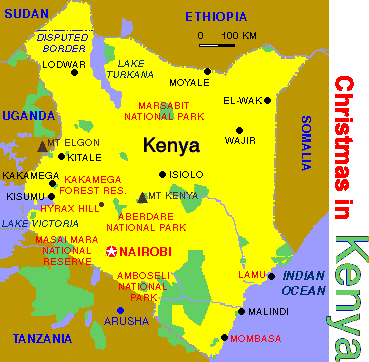It seems that what started as a political problem in Kenya last month with a flawed presidential election has rapidly developed into an ethnic one and Kenya’s police and military have been struggling to stop the growing wave of revenge killings.
The trouble in Kisumu began at 8 a.m. when a pack of young men from the Luo ethnic group set fire to a bus believed to be owned by Kikuyus, another ethnic group. Witnesses said the Luos were exacting revenge for what happened the day before in the town of Naivasha when a mob of Kikuyus trapped 19 Luo people, including 11 children, inside a house and burned them to death.
This time, the passengers in the bus apparently escaped. But by 2 p.m., thousands of rioters were sweeping across Kisumu, burning down shops and looting stores. The city is a stronghold of Kenya’s opposition movement and was gutted by furious mobs in late December.
“Things are really bad again,” said Jacob Otieno Obiero, a Kisumu resident, on Monday afternoon. “There are fires everywhere.”
Police officers clashed with the rioters, and witnesses said officers shot five people, killing two of them. Witnesses said that gangs of Luos, who make up the vast majority of the population in Kisumu, were prowling certain neighborhoods looking for Kikuyus to kill.
Members of the Luo and Kikuyu ethnic groups have been at each other’s throats since Dec. 30, when Kenya’s election commission declared the incumbent president, Mwai Kibaki, a Kikuyu, the winner over Raila Odinga, an opposition leader and a Luo.
Western observers have said there were so many flaws in the vote counting process that it was impossible to tell who really won the election. The dispute seems to have stirred up other, older, poisonous feelings about land, economic opportunity and political power. More than 750 people have been killed and 300,000 displaced since the election. The fighting has spread across the Rift Valley region, a particularly picturesque part of Kenya known more for its game parks and fancy lodges but which has suddenly become a battle zone.
Luos and Kikuyus continued to literally face off in Naivasha in Kenya’s Rift Valley on Monday, with a thin line of police separating hundreds of angry young men shaking machetes, iron bars and splintery lengths of wood at each other.
It seemed that the police, in this case, were able eventually to disperse the crowds and there were no reports of killings.
Hussein Ali, Kenya’s police commander, told reporters on Monday that his officers had arrested 159 people in Naivasha and Nakuru, another Rift Valley town, “for possession of crude weapons and for suspected involvement in the murders.” He also said 95 people were arrested in Nairobi, the capital, but gave no details.
The burning of the house in Naivasha on Sunday was a similar episode to one on Jan. 1, when up to 50 women and children seeking shelter in a church in another Rift Valley town were burned to death by a mob. The victims in that case were mostly Kikuyus, and Kikuyus across the country seem to have been attacked more than any other group.
In the past few days, many Kikuyus have organized into militias, saying they are now ready for revenge.
The Kenya of today is almost unrecognizable compared with the Kenya that until recently was celebrated as one of the most stable and promising countries on the African continent.[*] On Sunday night, local television stations showed menacing young men waving machetes and iron bars at roadblocks along one of the country’s busiest highways. The men threw rocks at buses, with one large bus run off the road, as police officers stood by.
The Kenyan Army was assigned early this month to help evacuate people from conflict zones, but on Friday, for the first time, soldiers were ordered to intervene between warring groups. That did not seem to make much of a difference, and witnesses said the soldiers had been as ineffective as the police.
A dusk-to-dawn curfew has been imposed in several Rift Valley towns, including Naivasha and Nakuru, but witnesses said violence continued to rage in the countryside, with bands of armed men burning down huts and attacking ethnic rivals.
Many Kenyans have said the most distressing aspect is that the opposing politicians, instead of cooperating to stop the bloodshed, continue to bicker over who started it.
*
